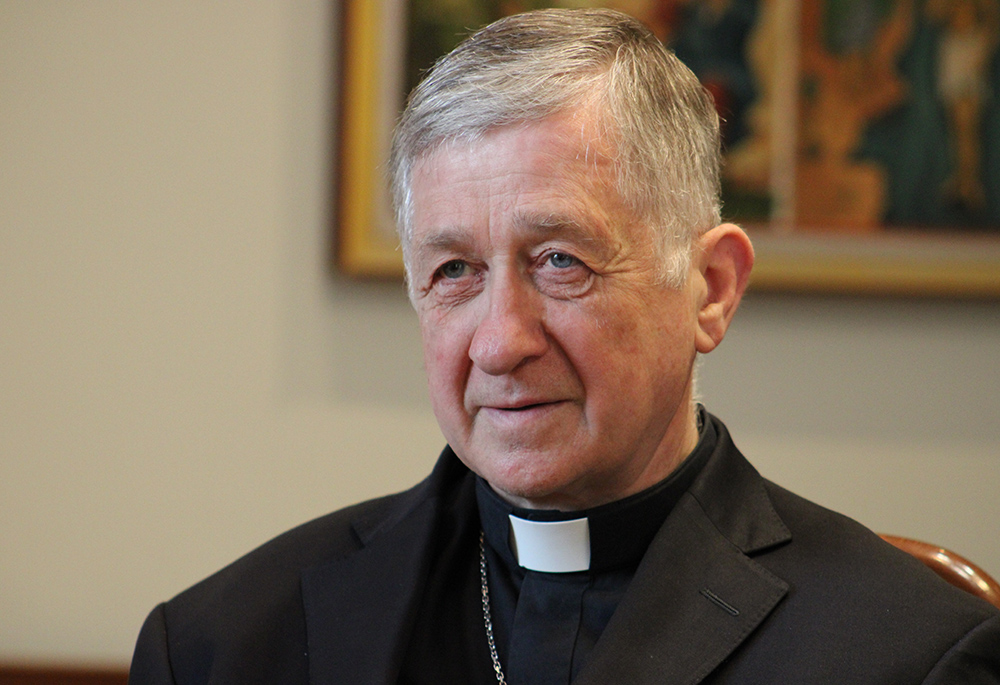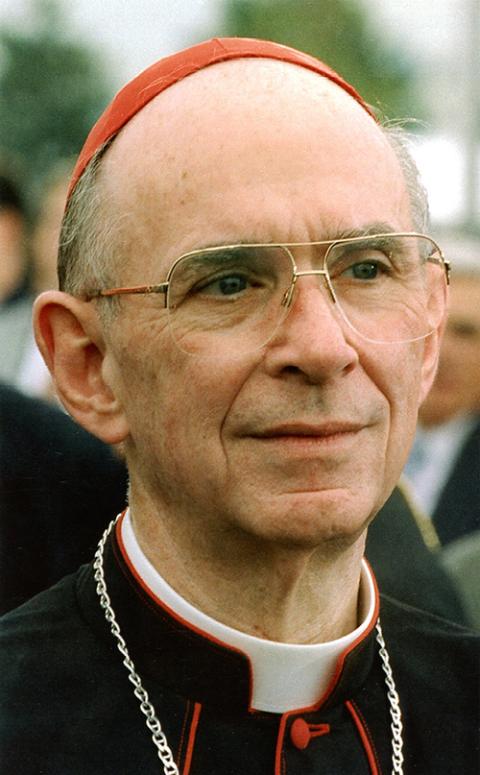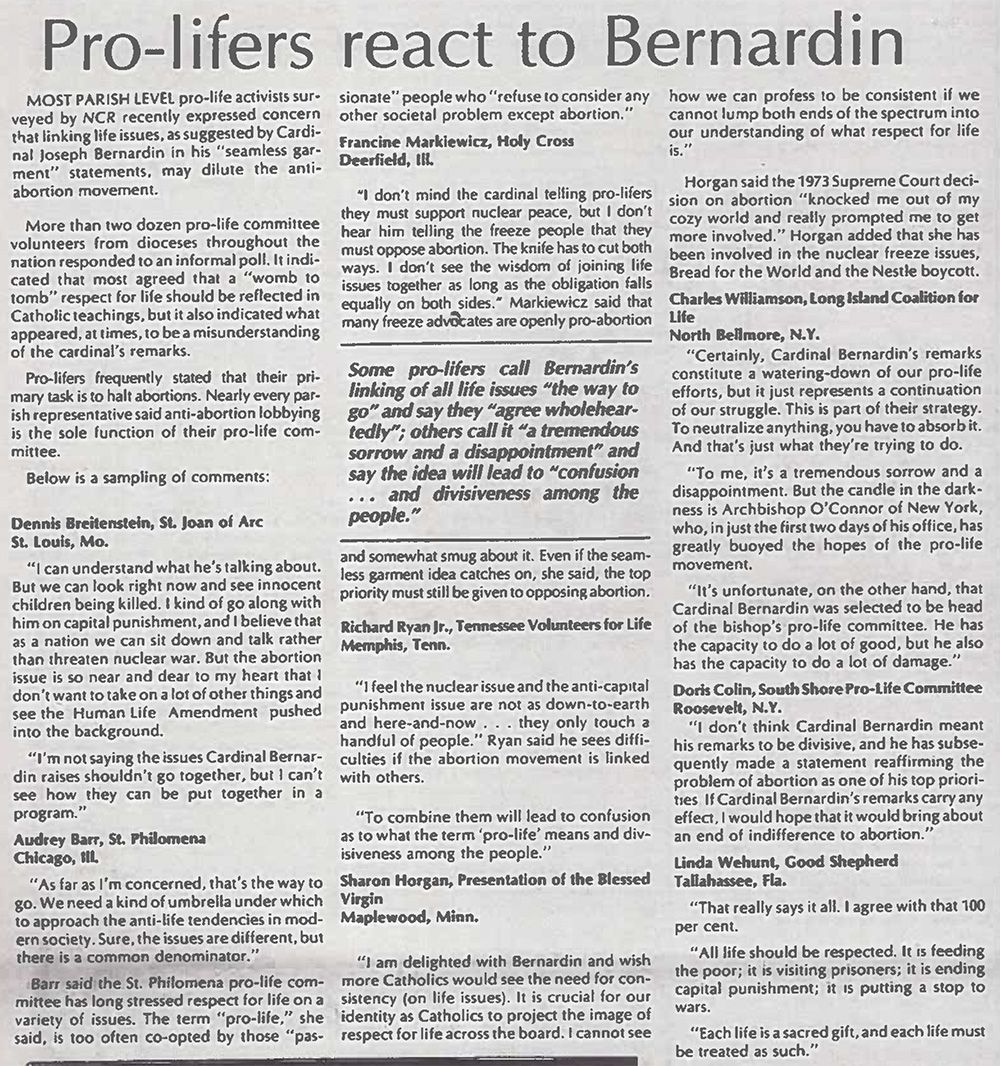
Chicago Cardinal Blase Cupich listens to a Ukrainian refugee family talk during a July 1, 2023, visit at the Basilian Sisters' monastery in Lviv, Ukraine. Cupich spoke Sept. 26 at Fordham University to commemorate Cardinal Joseph Bernardin's "consistent ethic of life" speech in 1983. (OSV News/Gina Christian)
Cardinal Blase Cupich commemorated the 40th anniversary of his predecessor Cardinal Joseph Bernardin's "consistent ethic of life" speech by returning last night to the site of that famous 1983 address, Fordham University. Cupich delivered his own address that clarified and defended what Bernardin had said, and then pivoted the concept to call for an integral ethic of solidarity. Now, as then, it remains to be seen if those who most need to hear the words of the archbishop of Chicago will do so.
The talk, which was sponsored by two of Fordham’s on-campus think tanks, the Curran Center for American Catholic Studies and the Center on Religion and Culture, drew over a hundred New Yorkers to the school’s Lincoln Center campus, including professors, students, seminarians and clergy. The full text of Cupich's remarks about Bernardin's “consistent ethic” was published this morning at L’Osservatore Romano.
"As a community of believers, we find ourselves beset by division, buffeted by a set of new questions about the church's relationship with the wider society, and even with itself," Cupich noted. "In many ways, we need this teaching now more than ever."
After listing the many issues Bernardin placed on the table as subject to his consistent ethic of life, Cupich added, "Cardinal Bernardin rooted these diverse issues in a single principle of Catholic faith: that the loss of even one human life is a momentous event. Seen in this context, abortion, nuclear war, poverty, euthanasia, and capital punishment all share a common identity in their denial of the right to life. That commonality calls for consistency."

The late Chicago Cardinal Joseph Bernardin is seen in this 1995 photo. (CNS files)
Consistency is not the same thing as leveling, and Cupich clarified a point that often got lost both among Bernardin's critics and his supporters. "The cardinal was not claiming that all life issues are equivalent. Instead, he forcefully argued for their distinctiveness, each requiring its own system of analysis, while emphasizing the reality of the interrelatedness of all threats to human life," Cupich said. He added that Bernardin "sought to leverage the analogical character of Catholic thought to engage a whole range of moral issues, each distinctively urgent, but all inextricably linked by the fundamental value of human life."
The confusion, intentional or not, about what Bernardin did and did not say was present from the beginning and it was rooted not in theology but in the strategy of some pro-life activists. What we know now, which was only beginning to be apparent 40 years ago, is that Catholics no longer approach issues of public policy, even issues with obvious moral significance, as Catholics first, but as Democrats or Republicans first. Cupich rightly looked at the role the politics of abortion played in this development: "The great sorting had begun."
NCR published the text of a follow-up speech by Bernardin, delivered at St. Louis University, in its April 6, 1984, issue, as well as some of the reactions to the series of speeches promoting the consistent ethic of life he began at Fordham. "Most parish level pro-life activists surveyed by NCR recently expressed concern that linking life issues, as suggested by Cardinal Joseph Bernardin in his 'seamless garment' statements, may dilute the anti-abortion movement," NCR reported.

Digital scan of the top-half of "Pro-lifers react to Bernardin," on Page 28 of the NCR print issue dated April 6, 1984 (NCR archives)
Two months later, (see the scanned article below) reporting on Bernardin's appearance at the National Right-to-Life convention, NCR noted, "On the meeting's first day, Bernardin presented his 'consistent pro-life ethic' position to about 600 but received a cooler reception than [Rev. Jerry] Falwell did."

Digital scan of "Bernardin, Falwell talk to pro-lifers," on Page 10 of the NCR print issue dated June 22, 1984 (NCR archives)
Alas, even now that the pro-life community has achieved its primary goal of overturning Roe v. Wade, the community remains confused about how to proceed. It is difficult not to conclude that some of that confusion would be less had they seen the value of Bernardin's approach. By putting politics first, they ended up winning their legal victory as part of an alliance with Donald Trump, who taints everything he touches, and in a way that left many state legislatures enacting via statute libertarian abortion laws what Roe had done by judicial fiat. The pro-life movement still has to convince the culture that all human life possesses dignity and inherent worth.
Cupich offered a fine analysis of changes that have made Bernardin's moral intuitions even more relevant in the intervening 40 years. But he doesn't leave it there. Instead, he takes up Bernardin's metaphor and retrofits it for our time.
"The consistent ethic of life could serve as a logical scaffolding for our analysis of life issues. Putting them into effect in a committed way — as Cardinal Bernardin had hoped — leads to an integral ethic of solidarity," Cupich said. "That ethic grounds our respect for life both interpersonally and within the human family. Solidarity points to the interconnectedness of all human beings, to the unity that they should strive for, and the responsibility for the common good that we all share. Solidarity is a moral virtue. It is a disposition of gratitude to God for the gifts he bestows upon us, and of service to those who suffer."
This section of his talk echoed a speech Cupich delivered to the Chicago Federation of Labor back in 2015. At Fordham last night, you could see that his thinking about solidarity has been deepened and developed, not least on account of the social magisterium of Pope Francis.
Cupich suggested, firstly, that a consistent ethic of solidarity should be grounded in Scripture as well as natural law, that an exclusive reliance on natural law reasoning can become dry, appealing only to reason. "And in the current cultural climate, reason is too rarely welcomed," he noted.
Second, the cardinal said a consistent ethic of solidarity must be rooted in the virtue of compassion, and empathy. He noted that a project undertaken by the U.S. bishops 14 years ago looked at ways to bridge the gap "between Catholics who were passionate about ending abortion but opposed to the church's stance on quality-of-life issues, and Catholics who were passionate about Catholic teaching regarding the poor, but opposed or neutral on the protection of the unborn." The point of contact between the two camps was compassion.
"Compassion frustrates the logic of team sports, which seems to govern civic life today, in which cruelty toward one's ideological opponents has taken on a perverse form of cultural currency," Cupich said. "It does so by replacing the logic of competition with the logic of love. When we let go of what we think we know is best, when we give up the need to control outcomes, we make room for God."
Cupich called for the ethic of solidarity to possess a "global perspective" and a "synodal" character, clearly showing the influence of Pope Francis on his thinking. Lastly, he said the ethic must be rooted in prayer.
It is difficult even to hope that Cupich's talk will resolve any of the internal tensions that afflict the church in the United States. He notes, correctly, that Bernardin had harbored a similar hope for his talk 40 years ago but a newfound unity did not come to pass. Cupich's discussion of Bernardin's contributions to the life of the church was heartfelt and powerful, a living, breathing example of the apostolic succession. There is plenty in this talk for theologians to unpack and develop but it is also highly accessible to a lay audience and young people. It was very fine. It should be seminal.







